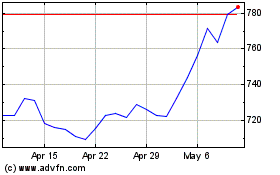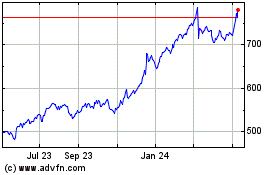By Laura Stevens and Amrith Ramkumar
Amazon.com Inc. followed Apple Inc. to become the second U.S.
company to reach $1 trillion in market value, reflecting the online
retailer's striking transformation from a profitless bookseller
into a disruptive force of commerce.
Shares of Amazon climbed 1.9% in midday trading Monday, topping
the $2,050.27 needed to push the company's value above $1 trillion.
The stock has surged 75% in 2018 and added more than $435 billion
to the company's market capitalization -- roughly the size of
Walmart Inc., Costco Wholesale Corp. and Target Corp. combined.
Investors have rewarded the Seattle-based company as it
demonstrated better financial discipline in recent quarters,
reporting record profits because of lucrative businesses such as
cloud computing despite aggressively spending on industries from
health care to grocery delivery.
"They've proven they can make it work," said Michael Lippert,
who manages the Baron Capital Opportunity Fund that counts Amazon
as its largest holding. "They're spending a lot on all these things
to build and enforce their competitive advantages."
Amazon and Apple, which hit the trillion-dollar milestone on
Aug. 2, symbolize the growing influence of tech companies on
markets and the economy. The industry is amassing wealth and power,
creating a new order in business where the most valuable resource
is no longer oil, but data. Not far behind in market value are
Google owner Alphabet Inc. and Microsoft Corp., both approaching
$900 billion, while Facebook Inc. -- which crossed $500 billion in
July 2017, a day after Amazon -- has stalled at those levels amid a
data-privacy scandal and growth concerns.
The companies' increasing clout have prompted lawmakers to
scrutinize the tech sector more closely. Amazon, which captures
nearly half of all U.S. dollars spent online, is simultaneously
drawing the ire of President Trump over its effect on traditional
retail and its use of the U.S. Postal Service. Sen. Bernie Sanders
has also criticized the company for the way it pays and treats its
warehouse workers, something Amazon has said is an inaccurate
portrayal.
Investors also worry about the tech companies' outsize impact on
the stock market. Amazon, Apple and Microsoft have accounted for
more than 35% of the S&P 500's total return this year,
according to S&P Dow Jones Indices data through Aug. 28.
One of the biggest beneficiaries of Amazon's growth is its
54-year-old leader, Jeff Bezos, who has surpassed Bill Gates to
become the richest man in the world, according to multiple indices
that track the world's wealthiest people. Mr. Bezos owned roughly
16% of Amazon, as of an August regulatory filing, and is worth
about $166 billion, according to the Bloomberg Billionaires
Index.
Amazon has expanded rapidly since its humble founding as an
online bookstore in Mr. Bezos's garage in 1994. The internet then
was just becoming a viable platform, and the most valuable
companies at the time included industrial conglomerate General
Electric Co., oil giant Exxon Inc. and telecommunications power
AT&T Inc.
Amazon was valued at less than $500 million when it went public
in 1997. A $1,000 investment in the IPO would be worth roughly $1.4
million today, adjusted for stock splits.
Tom Alberg, founding managing director for Madrona Venture
Group, invested in Mr. Bezos's initial $1 million round of funding
in 1995 and has served on the board since the beginning. At the
time, "I don't think that any of us saw that [the internet] or
Amazon would become as significant as they've become," Mr. Alberg
said. He preferred to buy his books in stores, and many believed
consumers would balk at paying with a credit card online.
Mr. Bezos and Amazon have been successful by staying intensely
focused on customers, working to retain top talent, innovating and
taking big risks on projects -- even if they fail, Mr. Alberg said.
"People have asked me, 'What's Amazon's secret to success?'" he
said. "There are no secrets."
Mr. Bezos has built his business by keeping prices low and
expanding quickly. Opening the company's site to millions of small
businesses, retailers and manufacturers accelerated growth, helping
capturing sales from other retail chains. Last year, the company's
online store sales topped $108 billion, and the services it sold
other merchants added to that total.
Amazon along the way has created popular electronic devices,
produced award-winning films and shows, and built a cash cow by
renting computer power on its servers to other companies. Amazon
Web Services made more than $17 billion in revenue last year and
has become the company's biggest profit driver.
In recent months, Amazon has acquired grocery chain Whole Foods
Market -- giving it roughly 470 brick-and-mortar locations -- and
online pharmacy PillPack. It has enabled logistics drivers to
deliver inside consumers' homes and cars, and is working on a
delivery service expected to one day compete with FedEx Corp. and
United Parcel Service Inc.
As the company expanded, Amazon's influence on markets also
grew. It has inspired exchange-traded funds that bet against
brick-and-mortar retailers, and even so-called value investors that
tend to avoid large tech and internet firms say they study the
company to understand other sectors.
"The tentacles of Amazon are so long and reach so many
industries that you have to have an understanding of that business
and where they're going," said Matt Lockridge, portfolio manager of
the Westwood Large Cap Value Fund.
It took Amazon just 165 trading days to grow its market value
from $600 billion in January to $1 trillion, pushing it past the
more established Microsoft and Alphabet. By comparison, Apple
needed 183 sessions to hit $1 trillion after piercing $900 billion
in November.
Amazon is more expensive than many of its peers. It trades at
about 90 times projected earnings for the next 12 months, compared
with valuations of roughly 25 for Alphabet and Microsoft and 17 for
Apple and the broader S&P 500. Part of the discrepancy is
because Amazon's record second-quarter earnings of $2.53 billion
are still billions below the profits generated by Apple, Alphabet
and Microsoft.
The higher market multiple is a reminder of how much investors
have embraced Mr. Bezos' strategy of heavy spending in the past 20
years. Some analysts expect Amazon to soon overtake Apple as the
largest U.S. company, which would mark the first such change since
2016, when Alphabet briefly passed the iPhone maker.
Mr. Bezos' initial shareholder letter in 1997 -- which he
resends every year -- touted the company's indifference to
"short-term Wall Street reactions." At all-hands meetings with
employees, Mr. Bezos has quoted legendary investor Benjamin Graham:
"In the short run, the market is a voting machine, but in the long
run, it is a weighing machine."
Write to Laura Stevens at laura.stevens@wsj.com and Amrith
Ramkumar at amrith.ramkumar@wsj.com
(END) Dow Jones Newswires
September 04, 2018 11:57 ET (15:57 GMT)
Copyright (c) 2018 Dow Jones & Company, Inc.
Costco Wholesale (NASDAQ:COST)
Historical Stock Chart
From Mar 2024 to Apr 2024

Costco Wholesale (NASDAQ:COST)
Historical Stock Chart
From Apr 2023 to Apr 2024
